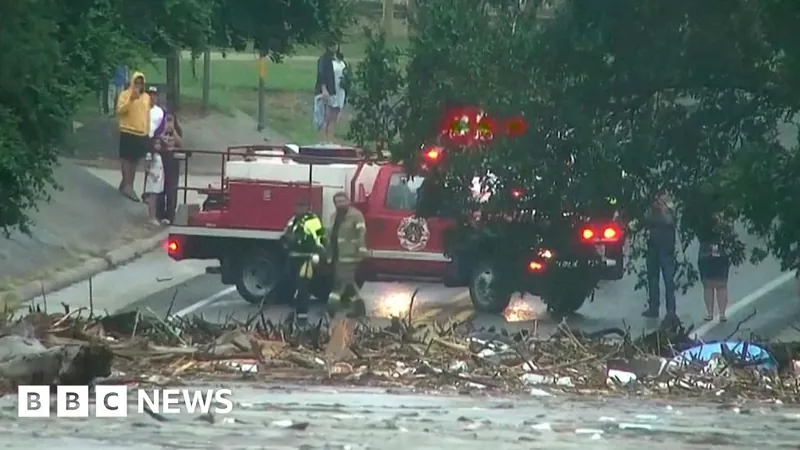
Israel-Hamas Ceasefire: Hope Amid Tension as Hostage Deal Approaches Approval
2025-01-17
Author: Sophie
As anticipation builds surrounding an impending ceasefire between Israel and Hamas, the security cabinet meeting in Jerusalem is underway to finalize a deal that could shape the lives of many. Families of hostages gathered in Tel Aviv this morning, pressuring officials to swiftly finalize the agreement. Among them, Michel Illouz shared his bittersweet emotions about the ongoing situation, expressing joy for every hostage saved, yet lamenting his son Guy, believed to have died in Gaza after being kidnapped from the Nova music festival. “This deal comes too late for my son… but he can be brought back home for burial here,” he stated passionately, emphasizing the urgency of bringing back every hostage, living or deceased.
Huda Matrabie, a displaced woman from Gaza, described the ceasefire as a "fragile moment of relief," filled with both hope for rebuilding lives and fear of further instability. “For many of us, it brings a possibility of returning to normalcy, even if just for a while,” she explained, revealing the duality of emotions that many in Gaza experience.
Potential Hurdles Looming Over Ceasefire Agreement
Despite the optimism surrounding the deal, significant hurdles remain. Israeli far-right factions, particularly led by national security minister Itamar Ben-Gvir, threaten to resign should the terms not align with their hardline stance. Additionally, logistical issues tied to Israel’s observance of the Sabbath may introduce delays. A religious exemption that allows exceptional work during Sabbath for saving lives could potentially mitigate these concerns.
Legal complexities also exist, as Israeli law provides a 48-hour window for public objections concerning specific Palestinian prisoners designated for release in exchange for hostages. Court proceedings could decide to expedite or delay this process, complicating the timeline of the ceasefire’s implementation.
As the cabinet meeting progresses, Prime Minister Benjamin Netanyahu's office confirmed that the security cabinet must vote to accept the deal and that a broader government approval is also necessary before the ceasefire takes effect. Negotiators have mobilized from Doha, conducting thorough assessments of the current security climate.
Aid Crisis Intensifies in Gaza
As negotiations continue, Gaza faces a dire humanitarian crisis, with a staggering 91% of residents experiencing acute food insecurity, according to the United Nations. The UN reports that aid has drastically dropped from an average of 500 trucks entering Gaza daily before the conflict began, to merely 37 trucks as of October 2023. This has spurred international outcry over the lack of access to vital resources.
UNICEF reported thousands of aid pallets stalled in warehouses in Jordan, awaiting transit into Gaza. Their spokesperson expressed optimism that the ceasefire could lead to improved conditions that would facilitate this distribution. “This ceasefire needs to materialize,” she stated, emphasizing the necessity to prioritize the safety and well-being of children in the region.
Hostages Release: A Potential Reality?
According to Netanyahu’s office, if the security cabinet approves the deal, hostages could potentially be released as early as Sunday. Each phase of the agreement foresees hostages being exchanged for Palestinian prisoners over a six-week period, with initial withdrawals focusing on women, children, and elderly individuals. However, many observers remain skeptical about the practicalities of this undertaking, watching closely for signs of instability, particularly as violence continues to plague the region.
Moreover, while some elements of Netanyahu's coalition government appear supportive of the ceasefire, others, especially from the far-right, signal a willingness to sever ties if it results in any compromise. This ongoing factional conflict adds another layer of complexity to the situation.
In summary, as discussions unfold over the ceasefire and hostage negotiations, the dual nature of hope and fear lingers heavily over both Israeli and Palestinian populations. With both sides grappling with the potential implications of these developments, the world watches in anticipation, hoping for a resolution while fearing renewed violence.









 Brasil (PT)
Brasil (PT)
 Canada (EN)
Canada (EN)
 Chile (ES)
Chile (ES)
 Česko (CS)
Česko (CS)
 대한민국 (KO)
대한민국 (KO)
 España (ES)
España (ES)
 France (FR)
France (FR)
 Hong Kong (EN)
Hong Kong (EN)
 Italia (IT)
Italia (IT)
 日本 (JA)
日本 (JA)
 Magyarország (HU)
Magyarország (HU)
 Norge (NO)
Norge (NO)
 Polska (PL)
Polska (PL)
 Schweiz (DE)
Schweiz (DE)
 Singapore (EN)
Singapore (EN)
 Sverige (SV)
Sverige (SV)
 Suomi (FI)
Suomi (FI)
 Türkiye (TR)
Türkiye (TR)
 الإمارات العربية المتحدة (AR)
الإمارات العربية المتحدة (AR)